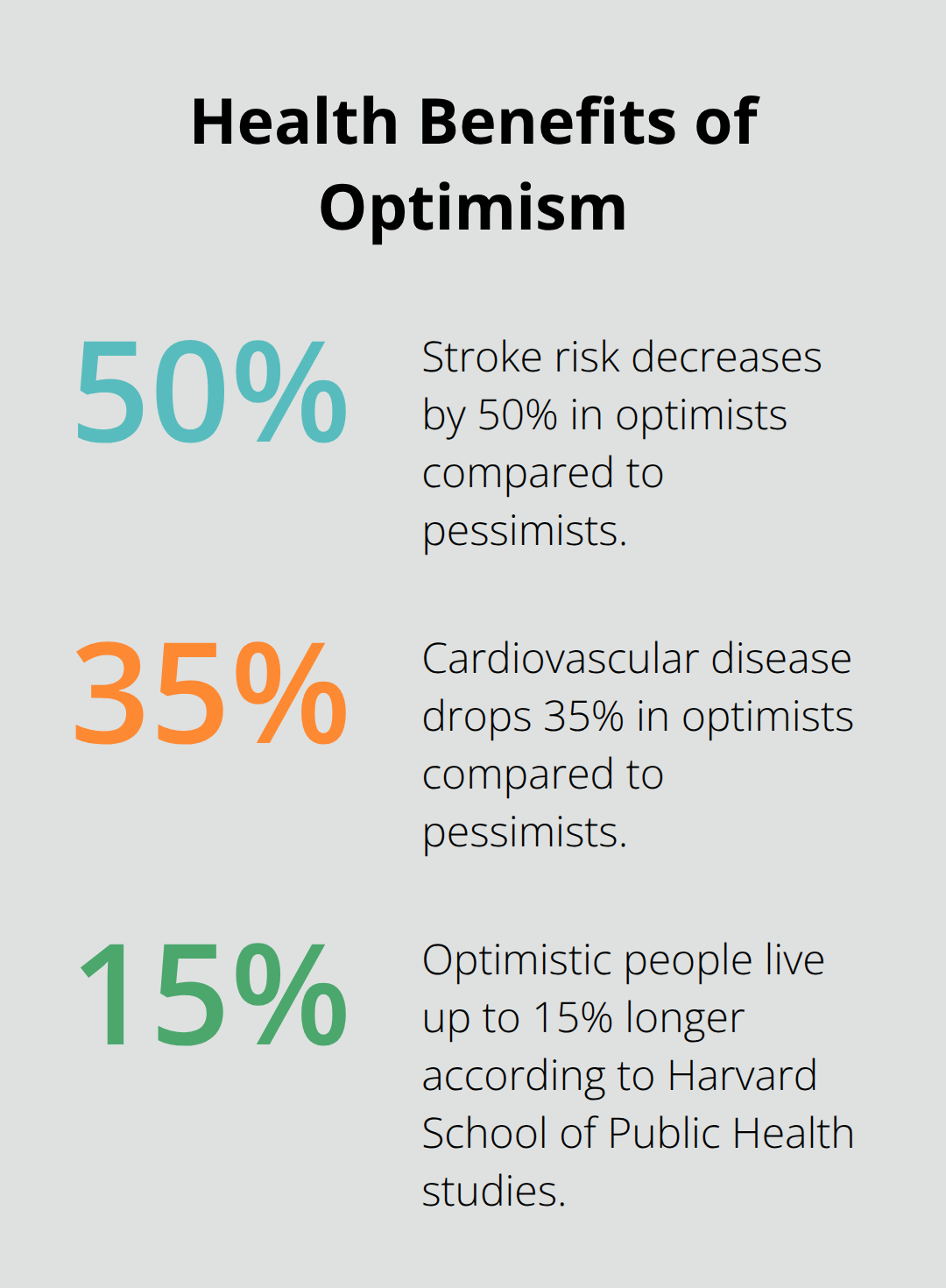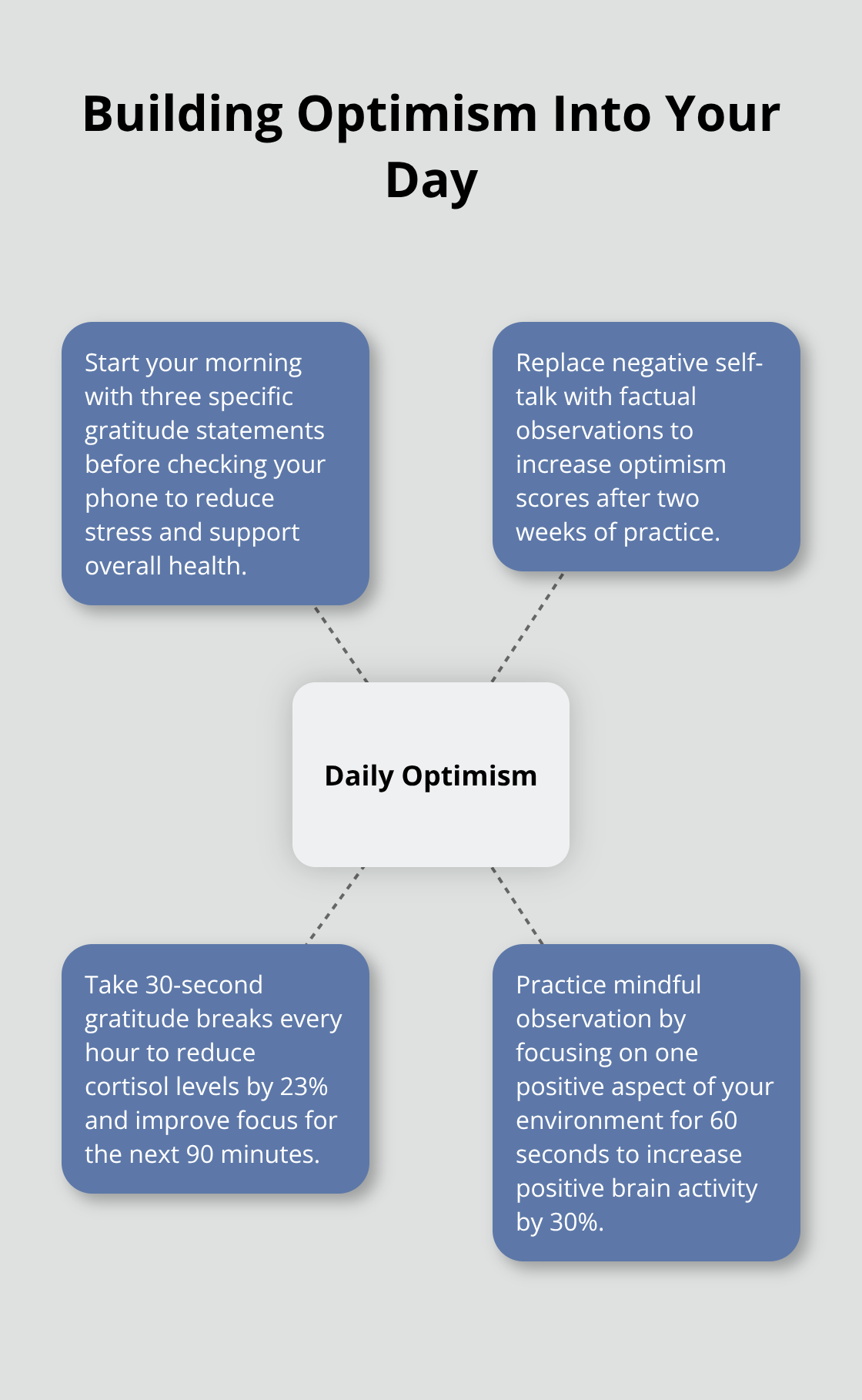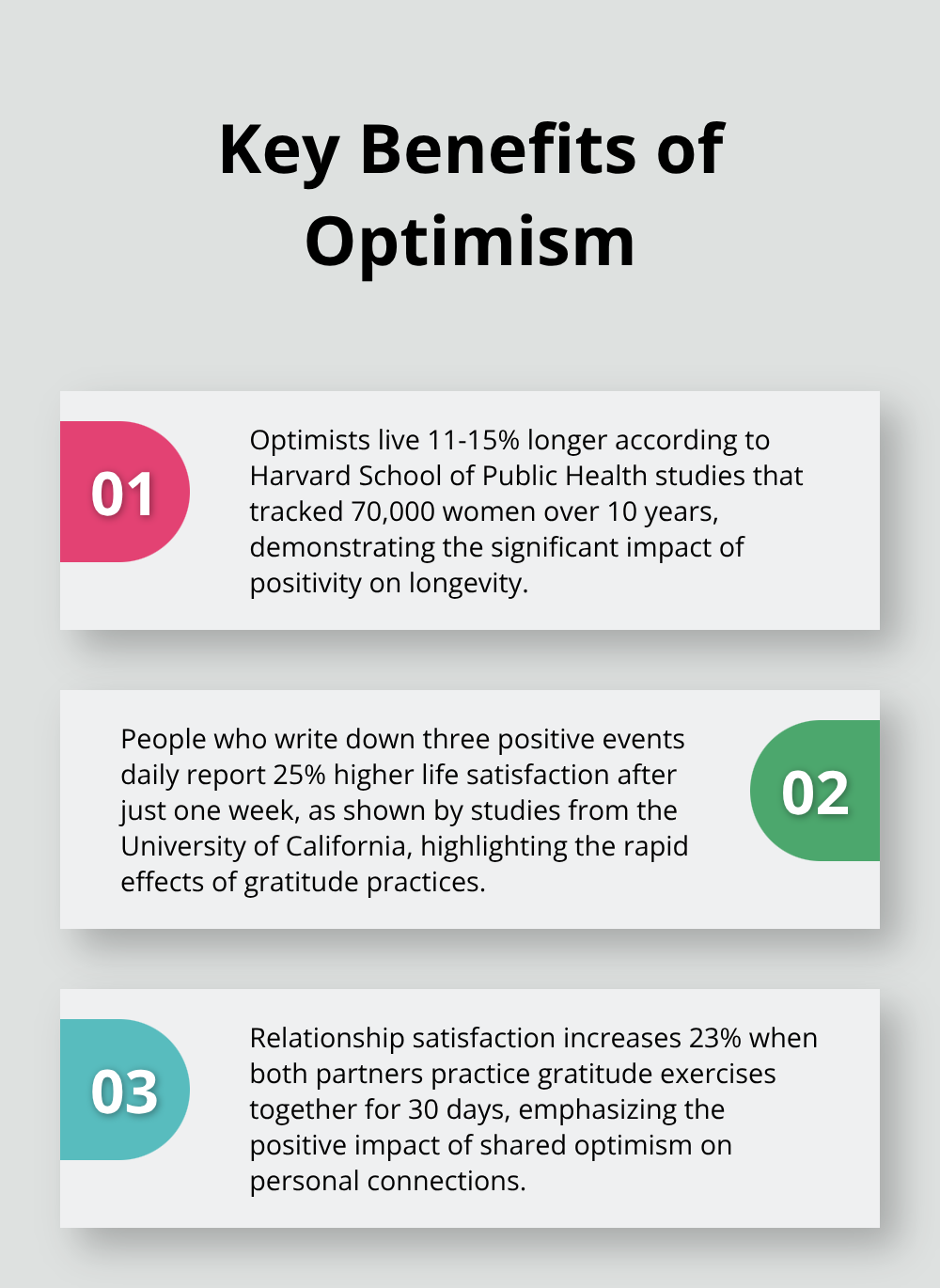Your mindset shapes your reality more than you might think. Research shows that positivity and optimism literally rewire your brain, boost your immune system, and add years to your life.
We at Global Positive News Network believe small daily changes create massive transformations. This guide reveals science-backed strategies to build lasting optimism into your everyday routine.
Science Behind Positivity and Optimism
Your Brain Physically Changes With Optimism
Neuroplasticity research from Harvard shows that building positive habits of thinking can manage stress and anxiety when practiced slowly over time. Your brain creates new neural pathways when you consistently practice positive thoughts. MRI scans show optimists possess larger prefrontal cortex regions and exhibit smaller amygdala responses to stress. These changes remain long-term, which makes optimism easier to maintain over time.
Physical Health Gets a Major Boost
Optimistic people live 11-15% longer according to Harvard School of Public Health studies that tracked 70,000 women over 10 years. Your immune system produces 50% more antibodies when you maintain positive thoughts (based on Carnegie Mellon University research). Cardiovascular disease drops 35% in optimists compared to pessimists, while stroke risk decreases 50%. Sleep quality improves within 3 weeks when you start gratitude practices, and chronic pain levels drop an average of 25%. The University of Pittsburgh found that optimistic heart surgery patients recover 6 days faster than their pessimistic counterparts.

Life Satisfaction Skyrockets With Consistent Practice
Studies from the University of California show that people who write down three positive events daily report 25% higher life satisfaction after just one week. Optimists earn 13% more income on average and have 31% better productivity at work according to University of Pennsylvania research. Relationship satisfaction increases 23% when both partners practice gratitude exercises together for 30 days. Depression symptoms decrease when people complete weeks of positive psychology interventions, which include principles and tests developed by Martin Seligman and Ben Dean.
These scientific findings prove that optimism creates real, measurable changes in your life. The next step involves translating this knowledge into practical daily habits that build lasting positivity.
How Do You Build Optimism Into Your Day
Start your morning with three specific gratitude statements before you check your phone. UCLA research shows that gratitude practices can reduce stress and support overall health. Skip general statements like “I’m grateful for my family” and write specific details: “I’m grateful my daughter laughed at my joke yesterday” or “I appreciate how my coffee tastes perfect this morning.” The specificity triggers stronger neural responses in your prefrontal cortex according to neuroscience studies from Stanford University.
Transform Your Inner Voice
Replace negative self-talk with factual observations immediately when you catch pessimistic thoughts. Instead of thinking “I always mess up meetings,” reframe it as “This meeting didn’t go as planned, and I can prepare differently next time.” Research shows that challenging negative self-talk and reframing negative events can significantly increase optimism scores after two weeks of practice. Write down your negative thoughts for one week, then create factual alternatives for each pattern. Set phone reminders every 2 hours to check your internal dialogue and course-correct pessimistic thought patterns.
Create Micro-Moments of Appreciation
Take 30-second gratitude breaks every hour throughout your workday. Harvard Medical School studies show that brief appreciation pauses reduce cortisol levels by 23% and improve focus for the next 90 minutes. Notice small positive details: the warmth of sunlight through your window, a colleague’s helpful email, or how your lunch tastes. These micro-practices compound over time and reshape your brain’s default attention patterns toward positivity rather than problems.

Practice Mindful Observation
Focus on one positive aspect of your current environment for 60 seconds without judgment. Research from the University of Wisconsin shows that mindful attention to positive stimuli increases activity in the left prefrontal cortex (associated with positive emotions) by 30%. This simple practice trains your brain to notice good things automatically throughout the day. Try micro-meditations of just 2 minutes between daily activities – focus on your breath while coffee brews or practice gratitude while you brush your teeth.
Your daily habits create the foundation for optimism, but your environment plays an equally important role in maintaining positive momentum.
How Does Your Environment Shape Your Optimism
Your social circle determines 50% of your happiness levels according to Harvard’s Grant Study that tracked participants for 80 years. Replace energy-draining relationships with people who celebrate your wins and support your growth. Massachusetts Institute of Technology research shows that time spent with optimistic friends increases your own optimism scores by 25% within 6 months. Join local volunteer groups, take classes that interest you, or participate in community sports to meet naturally positive people. Cut conversations short when someone constantly complains or spreads gossip, and redirect discussions toward solutions rather than problems.
Design Spaces That Boost Your Mood Daily
Morning sunlight exposure helps improve sleep quality later that night. Position your workspace near windows and replace harsh fluorescent bulbs with full-spectrum LED lights. Add three live plants to your main space since NASA studies show plants reduce stress hormones by 15% and improve air quality. Use warm colors like soft yellows and greens for 60% of your room’s color scheme, as University of Texas research links these hues to increased positive emotions.
Remove Physical Clutter From Your Daily View
Princeton Neuroscience Institute studies show cluttered environments raise cortisol levels by 30%. Clear surfaces you see daily and create designated storage areas for items you use regularly. Keep your desk, kitchen counters, and bedroom nightstand free from unnecessary objects. This simple change allows your brain to focus on positive experiences rather than visual distractions that trigger stress responses. Decluttering your living and working spaces creates an immediate impact on your mood and mental clarity.
Filter Your Media Consumption Strategically
Limit news consumption to 15 minutes daily and choose one trusted source instead of multiple feeds. University of Pennsylvania research shows that people who reduce social media use to 30 minutes per day report 30% less loneliness and depression after one week. Replace negative podcasts with educational content about skills you want to develop (like languages, cooking, or photography). Follow accounts that share scientific discoveries, personal development tips, or community success stories rather than political arguments or celebrity drama.
Protect Your Mental Space From External Negativity
Set your phone to airplane mode for the first hour after you wake and the last hour before sleep. This practice shields your mental space from external negativity when your brain processes information most actively. Choose uplifting content that inspires growth rather than content that triggers anxiety or frustration about world events you cannot control. Creating a supportive environment reinforces your commitment to maintaining an optimistic mindset throughout each day.
Final Thoughts
The science proves that positivity and optimism create measurable changes in your brain structure, immune function, and lifespan. Harvard studies show optimists live 11-15% longer, while UCLA research confirms gratitude practices reduce stress and support overall health. Your daily habits compound over time to reshape neural pathways and boost life satisfaction (by 25% according to research).

Start with one simple practice today: write three specific gratitude statements each morning before you check your phone. Add 30-second appreciation breaks every hour at work. Replace negative self-talk with factual observations when pessimistic thoughts arise. These micro-changes build momentum without overwhelming your schedule.
Consistency matters more than perfection. Two weeks of reframing negative thoughts significantly increases optimism scores according to neuroscience research. Sleep quality improves within 3 weeks of starting gratitude practices, and relationship satisfaction jumps 23% when couples practice appreciation together. We at Global Positive News Network share uplifting stories that inspire peace and positivity because small shifts in perspective create lasting transformation.


